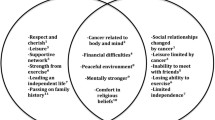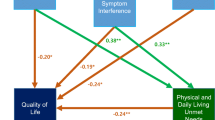Abstract
Goals of work
We aimed to identify clinical experiences associated with outcomes of care among stomach cancer patients.
Materials and methods
Four hundred thirty-two patients who had a diagnosis of stage I–III stomach cancer from 2001 through 2002 from two hospitals in South Korea responded to a survey questionnaire including sociodemographic and clinical data, information about care experiences, satisfaction with care, and quality of life (QOL).
Main results
Involvement in decision making [adjusted odds ratio (aOR) = 1.81; 95% confidence interval (CI), 1.13 to 2.89] and reflection of patients’ opinions in treatment decisions (aOR = 2.54; 95% CI, 1.65 to 3.93) were associated with decision satisfaction. The factors associated with willingness to choose the same treatment over again were involvement in decision making (aOR = 2.37; 95% CI, 1.53 to 3.68) and no treatment toxicity (aOR = 0.50; 95% CI, 0.29 to 0.87). Involvement in decision making, reflection of patients’ opinions in treatment decisions, and treatment toxicity were associated with some functioning subscales of QOL (p < 0.05). Regular follow-up, however, was associated with poor social functioning.
Conclusions
Quality improvement efforts for stomach cancer patients should focus not only on the quality of primary tumor therapy but also on how patients experience their care, such as patient-centered decision making, experience of treatment toxicity, and regular follow-up.


Similar content being viewed by others
References
Sano T, Sasako M, Yamamoto S et al (2004) Gastric cancer surgery: morbidity and mortality results from a prospective randomized controlled trial comparing D2 and extended para-aortic lymphadenectomy—Japan Clinical Oncology Group study 9501. J Clin Oncol 22:2767–2773
Smith DD, Schwarz RR, Schwarz RE (2005) Impact of total lymph node count on staging and survival after gastrectomy for gastric cancer: data from a large US-population database. J Clin Oncol 23:7114–7124
Teunissen JJ, Kwekkeboom DJ, Krenning EP (2004) Quality of life in patients with gastroenteropancreatic tumors treated with [177Lu-DOTA0,Tyr3] octreotate. J Clin Oncol 22:2724–2729
Jansen EP, Boot H, Verheij M et al (2005) Optimal locoregional treatment in gastric cancer. J Clin Oncol 23:4509–4517
Meyer HJ (2005) The influence of case load and the extent of resection on the quality of treatment outcome in gastric cancer. Eur J Surg Oncol 31:595–604
Hewitt M, Simone JV et al (1999) Institute of Medicine Report: ensuring quality cancer care—National Cancer Policy Board, Institute of Medicine Report and National Research Council. Washington, DC, National Academy Press
Schneider EC, Malin JL, Kahn KL et al (2004) Developing a system to assess the quality of cancer care: ASCO’s national initiative on cancer care quality. J Clin Oncol 22:2985–2991
Ayanian JZ, Chrischilles EA, Fletcher RH et al (2004) Understanding cancer treatment and outcomes: the Cancer Care Outcomes Research and Surveillance Consortium. J Clin Oncol 22:2992–2996
Khuri SF, Daley J, Henderson WG (2002) The comparative assessment and improvement of quality of care in the Department of Veterans Affairs. Arch Surg 137:20–27
Davoli M, Amato L, Minozzi S et al (2005) Volume and health outcomes: an overview of systematic reviews. Epidemiol Prev 29(S):3–63
Kavadas V, Barham CP, Finch-Jones MD et al (2004) Assessment of satisfaction with care after inpatient treatment for oesophageal and gastric cancer. Br J Surg 91:719–723
Bae JM, Kim S, Kim YW et al (2006) Health-related quality of life among disease-free stomach cancer survivors in Korea. Qual Life Res 15:1587–1596
Lantz PM, Janz NK, Fagerlin A et al (2005) Satisfaction with surgery outcomes and the decision process in a population-based sample of women with breast cancer. Health Serv Res 40:745–767
Mandelblatt J, Armetta C, Yabroff KR et al (2004) Descriptive review of the literature on breast cancer outcomes: 1990 through 2000. J Natl Cancer Inst Monogr 33:8–44
Department of Health Care Policy Rockville, MD (2003) Available at https://www.cahps-sun.org/Projects/ResultsForQI.asp#utility. Accessed November 4, 2005
Hoffman RM, Hunt WC, Gilliland FD et al (2003) Patient satisfaction with treatment decisions for clinically localized prostate carcinoma. Results from the Prostate Cancer Outcomes Study. Cancer 97:1653–1662
Aaronson NK, Ahmedzai S, Bergman B et al (1993) The European Organization for Research and Treatment of Cancer QLQ-C30: a quality-of-life instrument for use in international clinical trials in oncology. J Natl Cancer Inst 85:365–376
Yun YH, Wang XS, Lee JS et al (2005) Validation study of the Korean version of the brief fatigue inventory. J Pain Symptom Manage 29:165–172
Leiberich P, Averbeck M, Grote-Kusch M et al (1993) The quality of life of tumor patients as a multidimensional concept. Z Psychosom Med Psychoanal 39:26–37
Robins JM, Hernan MA, Brumback B (2000) Marginal structural models and causal inference in epidemiology. Epidemiology 11:550–560
Rubin DB (1997) Estimating causal effects from large data sets using propensity scores. Ann Intern Med 11:757–763
Fayers PM, Aaronson N, Bjordal K et al (2001) The EORTC QLQ-C30 scoring manual (ed. 3). Brussels, Belgium, European Organization for Research and Treatment of Cancer
Hundahl SA, Wanebo HJ (2005) Changing gastric cancer treatment in the United States and the pursuit of quality. Eur J Surg Oncol 31:605–615
Malin JL, Schneider EC, Epstein AM et al (2006) Results of the National Initiative for Cancer Care Quality: how can we improve the quality of cancer care in the United States? J Clin Oncol 24:626–634
Mandelblatt JS, Edge SB, Meropol NJ et al (2003) Predictors of long-term outcomes in older breast cancer survivors: perceptions versus patterns of care. J Clin Oncol 21:855–863
de Haes JC, Curran D, Aaronson NK et al (2003) Quality of life in breast cancer patients aged over 70 years, participating in the EORTC 10850 randomised clinical trial. Eur J Cancer 39:945–951
Gattellari M, Butow PN, Tattersall MH (2001) Sharing decisions in cancer care. Soc Sci Med 52:1865–1878
Jefford M, Tattersall MH (2002) Informing and involving cancer patients in their own care. Lancet Oncol 3:629–637
Kleeberg UR, Tews JT, Ruprecht T, Höing M, Kuhlmann A, Runge C (2005) Patient satisfaction and quality of life in cancer outpatients: results of the PASQOC study. Support Care Cancer 13:303–310
Bennett JJ, Gonen M, D'Angelica M et al (2005) Is detection of asymptomatic recurrence after curative resection associated with improved survival in patients with gastric cancer? J Am Coll Surg 201:503–510
Hewitt ME, Bamundo A, Day R, Harvey C (2007) Perspectives on post-treatment cancer care: qualitative research with survivors, nurses, and physicians. J Clin Oncol 25:2270–2273
Acknowledgment
This work was supported by National Cancer Center Grant 04101502 and 0710421-1.
Author information
Authors and Affiliations
Corresponding author
Additional information
Dr. Sung Kim and Dr. Jae-Moon Bae contributed equally to this work as first authors.
Appendix
Appendix
Rights and permissions
About this article
Cite this article
Kim, S., Bae, JM., Kim, YW. et al. Self-reported experience and outcomes of care among stomach cancer patients at a median follow-up time of 27 months from diagnosis. Support Care Cancer 16, 831–839 (2008). https://doi.org/10.1007/s00520-007-0340-x
Received:
Accepted:
Published:
Issue Date:
DOI: https://doi.org/10.1007/s00520-007-0340-x




